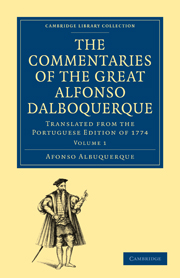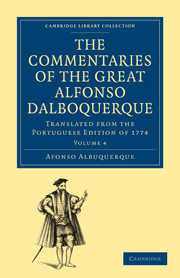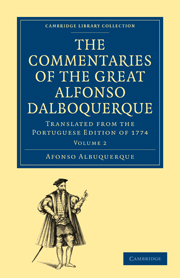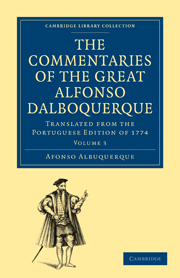Olhai que ledos vão por varias vias,
Quaes rompentes leoens, e bravos touros,
Dando os corpos a fomes, e vigias,
A ferro, a fogo, a settas, e pilouros,
A quentes regioens, a plagas frias,
A golpes de idolatras, e de Mouros,
A perigos incognitos do mundo,
A naufragios, a peixea, ao profundo.
Cam. Lus., X, 147The present volume contains the translation of the Fourth and last Part of the Commentaries of the Great Afonso Dalboquerque, as written by his son. The interest in the career of the hero is sustained throughout, and a short summary of the principal events recorded herein may with propriety be introduced at this part of the work. The portrait which is placed as a frontispiece to this volume is a reduced photographic facsimile from that given in Correa's Lendas da India, at the place which treats of that period in the history of Portuguese India when the Lusitanian sceptre was practically swayed there by this great man. Its value as a contemporary portrait is undoubtedly great, and it may be compared with the portraits derived from other sources which have illustrated the previous volumes of this translation.
After setting affairs in order at Goa, under the chief captaincy of Pero Mascarenhas, Afonso Dalboquerque set sail on the 7th of February, A.D. 1513, with a body of seventeen hundred Portuguese and eight hundred natives, in twenty ships, intending, in accordance with instructions which he had received from the King of Portugal, to make the voyage to Adem, with a view of capturing that site, of the importance of which, from a military and strategic point of view, he was fully aware.



